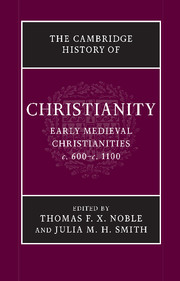Book contents
- Frontmatter
- Introduction: Christendom, c. 600
- Part I Foundations: Peoples, Places, and Traditions
- Part II Christianity in Confrontation
- Part III Christianity in the Social and Political Order
- Part IV Christianity as Lived Experience
- Part V Christianity: Books and Ideas
- 24 Visions of God
- 25 Orthodoxy and deviance
- 26 Making sense of the Bible
- 27 The Christian book in medieval Byzantium
- 28 Saints and their cults
- 29 Last Things
- Conclusion: Christendom, c. 1100
- Bibliographies
- Index
- References
24 - Visions of God
from Part V - Christianity: Books and Ideas
Published online by Cambridge University Press: 28 March 2010
- Frontmatter
- Introduction: Christendom, c. 600
- Part I Foundations: Peoples, Places, and Traditions
- Part II Christianity in Confrontation
- Part III Christianity in the Social and Political Order
- Part IV Christianity as Lived Experience
- Part V Christianity: Books and Ideas
- 24 Visions of God
- 25 Orthodoxy and deviance
- 26 Making sense of the Bible
- 27 The Christian book in medieval Byzantium
- 28 Saints and their cults
- 29 Last Things
- Conclusion: Christendom, c. 1100
- Bibliographies
- Index
- References
Summary
No one can see God. St. Paul, rehearsing the ancient warning of the book of Exodus (33.20), maintained that before final beatitude, human beings cannot know God except “through a glass, darkly” (1 Cor. 13.12). In the patristic period from Irenaeus (c. 130–c. 200) to Pseudo-Dionysius (c. 500), contemplation may have appeared to provide a way of accessing the divine, a means, as it were, of getting beyond the mirror – though the East, influenced by the condemnation of the heresy of Eunomius (d. 394) in the latter half of the fourth century, long maintained the fundamental unknowability of God against the West. However, although this contemplative tradition did indeed continue, in our period of 600 to 1100 CE, it was the quest (both speculative and practical) for sensible and intellectual mediations between the divine and the human that predominated. This basic orientation, which resulted in a massive transformation of the landscape of human life – a landscape henceforth graced with a multifaceted structure of signs and images of divinity – corresponds to the period of Christianity’s political and social establishment. As a religion established upon (and housed within) the fragmentation of social and political powers, Christianity found it necessary to display visible markers of identity and legitimacy. If the divine essence, though infinite, had disclosed itself to the finite perception of human beings, its manifestation in the created world (and notably in the presence of the incarnate Christ) had left traces or tracks which could be both found and followed.
- Type
- Chapter
- Information
- The Cambridge History of Christianity , pp. 489 - 509Publisher: Cambridge University PressPrint publication year: 2008

